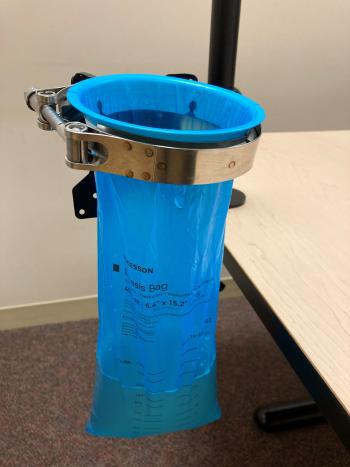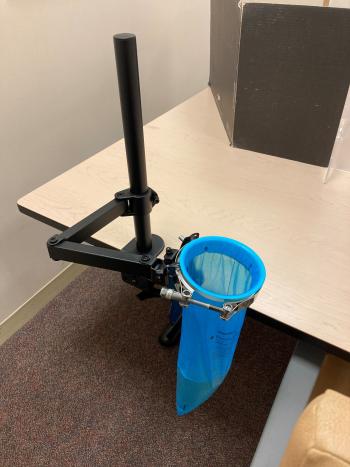Section of Sensory Science, and Metabolism


Contact Information
- Office: 301-827-5234
- Lab: 301-339-4869
- Fax: 301- 480-1413
-
Mailing Address
Section of Sensory Science, and Metabolism (SenSMet)
10 Center Drive
Building 10, Room 1-5429
Bethesda , MD 20892
Overview of the Lab
The Section of Sensory Science and Metabolism (SenSMet) investigates the complex interactions between chemosensation (taste, smell, and chemesthesis), metabolic regulation, and brain function. Our research focuses on how sensory perception influences eating behavior, metabolic health, and neurological disorders, particularly in conditions such as obesity, alcohol use disorder (AUD), and neurodegenerative diseases.
Chemosensory function plays a vital role in shaping food choices, detecting environmental cues, and maintaining overall well-being. Emerging evidence suggests that disruptions in taste and smell perception are linked to alterations in brain circuits governing motivation, reward, and metabolism. These disruptions are increasingly recognized in individuals with obesity, substance use disorders, and neurodegenerative conditions such as Parkinson’s and Alzheimer’s disease.
Despite the growing recognition of chemosensation’s role in health and disease, the neurobiological and molecular mechanisms underlying its dysfunction remain poorly understood. Through clinical and translational research, our lab aims to bridge this knowledge gap, ultimately paving the way for new interventions to improve metabolic and neurological health.
Our work explores the intersection of sensory perception, brain function, and human health, focusing on:
- Neurobiology of taste & smell in obesity and addiction – How does chemosensation shape reward pathways and influence overconsumption?
- Chemosensory dysfunction as an early biomarker for neurodegenerative diseases – Can changes in smell and taste signal cognitive decline before standard clinical symptoms appear?
- AI-driven models for personalized sensory mapping – How can machine learning predict individual variations in chemosensory function?
- VR-based simulations for taste and smell research – Can immersive environments recreate and manipulate sensory experiences for scientific exploration?
Through clinical-translational research, state-of-the-art neuroimaging, computational modeling, and AI-driven analytics, we aim to revolutionize precision medicine approaches in obesity, addiction, and neurodegenerative disease research.
Mission Statement
The SenSMet Lab is dedicated to uncovering the neurobiological, molecular, and behavioral mechanisms that shape chemosensory perception and its role in health and disease. Our research integrates neuroscience, metabolism, and sensory science to understand how taste and smell influence eating behavior, alcohol consumption, and brain function in individuals with obesity, AUD, and neurodegenerative diseases. We are pioneering next-generation research approaches to understand:
- How the brain processes chemosensory information to drive decision-making, reward, and consumption behaviors.
- The molecular and neural signatures of sensory dysfunction in metabolic and neurodegenerative diseases.
- Cutting-edge interventions leveraging AI, VR, and precision neuroscience to develop novel treatments for obesity, addiction, and cognitive decline.
Using advanced neuroimaging (fMRI, EEG), real-time metabolic monitoring, and AI-powered sensory profiling, we are pushing the boundaries of personalized medicine and digital health solutions in neuroscience and metabolism research.
Key Research Questions
Our lab is answering fundamental questions at the cutting edge of sensory neuroscience and metabolic research:
- How do taste and smell alterations influence eating behavior, metabolic health, and addiction?
- How do the brain’s reward and motivation circuits process chemosensory information in obesity and substance use disorders?
- How do inflammatory processes and environmental exposures alter chemosensory perception and neural function?
- What are the long-term neurological consequences of immune system activation on sensory pathways, cognition, and metabolic regulation?
- Can AI-driven sensory mapping identify individual differences in taste and smell perception?
- How can VR-based simulations be used to recreate, modify, or enhance chemosensory experiences for research and clinical applications?
We aim to redefine the future of chemosensory science, metabolic health, and brain disease research by combining human and animal models, AI-powered analytics, and neurotechnology.
Technologies & Methodologies: Next-Generation Sensory Science
Our lab employs a multidisciplinary, technology-driven approach to unravel the complexities of chemosensation, metabolism, and brain function:
- Molecular & Genetic Profiling – Identifying sensory-related biomarkers in metabolic and neurodegenerative disorders.
- Preclinical Rodent Models – Investigating cellular and molecular mechanisms underlying sensory processing and behavior.
- AI & Machine Learning for Personalized Sensory Mapping – Identifying individual chemosensory signatures linked to metabolic and neurological health.
- Advanced Neuroimaging (fMRI, EEG) – Real-time mapping of chemosensory perception, reward pathways, and cognitive processing.
- VR-Based Sensory Testing – Simulating controlled, immersive taste and smell experiences for research applications.
Current Research Studies
SenSMet Clinical Research Protocols:
- Mechanisms Underlying Individual Variations of Taste and Smell in Obesity
- Individual Variations of Taste and Smell Perception in Alcohol Use Disorder (AUD)
- Effects of Sucralose on Drug Absorption and Metabolism (The SweetMeds Study)
- AI and VR for Chemosensory Dysfunction in Aging, Neurodegeneration and substance use disorders – Developing machine learning models for early detection.
Collaborative Protocols:
- Unit and Clinic Evaluation, Screening, Assessment and Management (14-AA-0181)
- Exploring Gut-Brain and Brain-Gut Interactions in Alcohol Use Disorder via Microbiota Investigations: A Pilot Study (17-AA-0093)
- COVID-19 Pandemic Impact on Alcohol and Related Outcomes
- Transmissibility and viral load of SARS-COV2 through oral secretions
- Brain Dopamine Function in Human Obesity (18-DK-0132)
Lab Members


Post-Doctoral Fellow, joint with National Smell and Taste Center and NICHD
Fatemeh Movaghari Pour








Post-Doctoral Visiting Fellow joint with National Institute on Mental Health
Eloise Kuijer, Ph.D.





Selected Publications
Joseph PV, Reed DR, Mennella JA. Individual Differences Among Children in Sucrose Detection Thresholds: Relationship with Age, Gender, and Bitter Taste Genotype. Nurs Res. 2016 Jan-Feb;65(1):3-12. doi: 10.1097/NNR.0000000000000138. PMID: 26633761; PMCID: PMC4679349.
Cooper KW, Brann DH, Farruggia MC, Bhutani S, Pellegrino R, Tsukahara T, Weinreb C, Joseph PV, Larson ED, Parma V, Albers MW, Barlow LA, Datta SR, Di Pizio A. COVID-19 and the Chemical Senses: Supporting Players Take Center Stage. Neuron. 2020 Jul 22;107(2):219-233. doi: 10.1016/j.neuron.2020.06.032. Epub 2020 Jul 1. PMID: 32640192; PMCID: PMC7328585.
Gerkin RC, Ohla K, Veldhuizen MG, Joseph PV, et al. Recent smell loss is the best predictor of COVID-19: a preregistered, cross-sectional study. Chemical Senses, bjaa081, doi: 10.1093/chemse/bjaa081 PMID: 32743605; PMCID: PMC7386529.
Joseph PV, Nolden A, Kober KM, Paul SM, Cooper BA, Conley YP, Hammer MJ, Wright F, Levine JD, Miaskowski C. Fatigue, Stress, and Functional Status are Associated with Taste Changes in Oncology Patients Receiving Chemotherapy. J Pain Symptom Manage. 2020 Nov 28: S0885-3924(20)30899-X. doi: 10.1016/j.jpainsymman.2020.11.029. Epub ahead of print. PMID: 33259906.
Joseph PV, Wang Y, Fourie NH, Henderson WA. A computational framework for predicting obesity risk based on optimizing and integrating genetic risk score and gene expression profiles. PLoS One. 2018 May 24;13(5): e0197843. doi: 10.1371/journal.pone.0197843. PMID: 29795655; PMCID: PMC5993110.
Joseph PV, Davidson HR, Boulineaux CM, Fourie NH, Franks AT, Abey SK, Henderson WA. Eating Behavior, Stress, and Adiposity: Discordance Between Perception and Physiology. Biol Res Nurs. 2018 Oct;20(5):531-540. doi: 10.1177/1099800418779460. Epub 2018 May 31. PMID: 29852756; PMCID: PMC6346320.
Joseph PV, Jaime-Lara RB, Wang Y, Xiang L, Henderson WA. Comprehensive and Systematic Analysis of Gene Expression Patterns Associated with Body Mass Index. Sci Rep. 2019 May 15;9(1):7447. doi: 10.1038/s41598-019-43881-5. PMID: 31092860; PMCID: PMC6520409.
Hall KD, Ayuketah A, Brychta R, Cai H, Cassimatis T, Chen KY, Chung ST, Costa E, Courville A, Darcey V, Fletcher LA, Forde CG, Gharib AM, Guo J, Howard R, Joseph PV, McGehee S, Ouwerkerk R, Raisinger K, Rozga I, Stagliano M, Walter M, Walter PJ, Yang S, Zhou M. Ultra-Processed Diets Cause Excess Calorie Intake and Weight Gain: An Inpatient Randomized Controlled Trial of Ad Libitum Food Intake. Cell Metab. 2019 Jul 2;30(1):67-77. e3. doi: 10.1016/j.cmet.2019.05.008. Epub 2019 May 16. Erratum in: Cell Metab. 2019 Jul 2;30(1):226. Erratum in: Cell Metab. 2020 Oct 6;32(4):690. PMID: 31105044.
Kure Liu C, Joseph PV, Feldman DE, Kroll DS, Burns JA, Manza P, Volkow ND, Wang GJ. Brain Imaging of Taste Perception in Obesity: a Review. Curr Nutr Rep. 2019 Jun;8(2):108-119. doi: 10.1007/s13668-019-0269-y. PMID: 30945140; PMCID: PMC6486899.
Other Lab Resources
Alumni
Postdoctoral Fellows
- Carlotta Vizioli, PhD, Postdoctoral Visiting Fellow 2019-2021, Research Fellow, NIH National Institute of Neurological Disorders and Stroke (NINDS)
- Markos Tesfaye, MD, PhD, Postdoctoral Visiting Fellow 2019-2021, Associate Professor of Psychiatry at
Jimma University, Ethiopia - Khushbu Agarwal, PhD, Postdoctoral Visiting Fellow 2023-2025
Postbaccalaurate Fellows
- Alexis Franks, BS., Post -Bac IRTA Fellow 2017-2020, Doctor of Physical Therapy student at Duke University
- Abhrarup (Abe) Roy, BS., Post -Bac IRTA Fellow 2017-2019, Medical Student, Cooper Hospital
- Brianna Brooks, BA, Postbaccalaureate IRTA, 2019-2021, PhD Student in Nutrition, Columbia University
- Rodrigo Ortiz, BS, Postbaccalaureate IRTA, NIH Academy 2019-2021, Medical Student at Ponce Health
Sciences University - Leann To, BS, Postbaccalaureate IRTA, NIH Academy 2021-2022, University of Pittsburgh, Pittsburgh,
PA, Master of Science in Genetic Counseling - Christian McDuffie, BS, Postbaccalaureate IRTA, NIH Academy 2020-2022, Masters in Public Health, George
Washington University - Anir Mahanty, BS, Postbaccalaureate IRTA, UGSP 2022-2023
- Meaghan Steck, BS, Postbaccalaureate IRTA, 2022-2023
- Nafisa Nawal, BS, Postbaccalaureate IRTA, NIH Academy 2021-2024
Former Staff
- Carolyn Allen, M.S., CRNP
- Claudia Colina-Prisco, PhD
Summer Fellows
- Emma Butturini, AMGEN Scholar, Summer Internship Program 2017
- Miriam Weiss, BSN., Summer Internship Program 2018, PhD student University of Maryland
- Kavisha Silva, Summer Internship Program 2018
- Natalia Iannarino, BS, Summer Internship Program 2019
- Erica Holland, Summer Internship Program 2019
- Hannah Davidson, BA, Summer Internship Program 2017
- Onyinyechi Ozoji, BSN, Summer Internship Program 2015
- Rafeeah Samad, BS, Summer Internship Program 2023
- Genesis Tolbert, BS, Summer Internship Program 2024
- Rama Woldebirhan, BS, Summer Internship Program 2024
How to Join the Lab
We welcome postdoctoral fellows, graduate students, postbaccalaureate fellows and summers interns to contribute to our cutting-edge research. Opportunities include:
- Postdoctoral research positions in neuroscience, metabolism, or sensory science.
- Graduate training for PhD candidates interested in chemosensation and metabolic health.
- Postbaccalaureate fellows & summer internship opportunities for undergraduate and master’s students.
For inquiries, visit our Opportunities page or Office of Intramural Training & Education (OITE).
Device Design for Emesis Collection During Taste Studies
We have developed an adjustable, hands-free metal device for taste testing expectorant collection. The device attaches to a tabletop with a clamp and holds an emesis bag open at an adjustable height for ease of use during taste studies.






